While I love my recipes just the way they are, I get a lot of questions about substitutions and ingredients swaps. To make life easier for all of us, I’m sharing this baking substitutions guide!
This is a high-level overview, and these swaps should work in most recipes.
I hope this baking substitutions guide will make life easier for those times when you realize you’re missing an ingredient mid recipe, or when you aren’t able to make another trip to the grocery store.

I also hope this will provide some great suggestions for altering my recipes to make them vegan-friendly, diary-free, gluten-free or even egg-free.
A lot of people have food allergies, but that doesn’t mean they shouldn’t get to enjoy a delicious homemade baked goods!!
I’ve organized this post based on the following categories:
- Flours
- Dairy
- Eggs
- Leavening agents (including yeast)
- Fats
- Sugars and Sweeteners
Flour Substitutions and Swaps
Most recipes call for the type of flour that makes it turn out it’s very best. But sometimes you might not have that specific type on hand, or you can’t find it at the store.
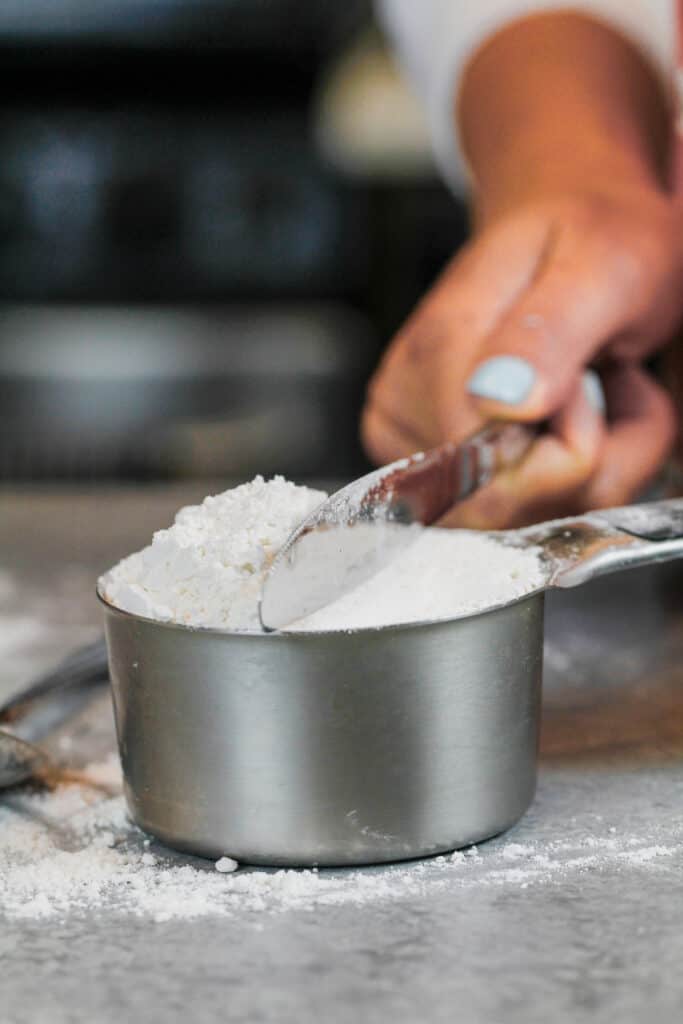
Keep in mind that using a different type of flour can change the texture or consistency of a baked good. However, if you use the ratios below, the recipe should still bake up great.
All Purpose Flour:
- 1 cup all-purpose flour= 1 cup GF flour blend (be sure to also overmix your batter & let it rest for 30 minutes before baking)
- 1 cup all-purpose flour= 1 1/3 cups cake flour
- 1 cup all-purpose flour= 1 cup self-rising flour (omit the leavening agent and salt from the recipe)
- 1 cup all-purpose flour= 1 cup bread flour
Cake Flour:
- 1 cup cake flour = 3/4 cup all-purpose flour + 2 Tbsp cornstarch
Bread Flour:
- 1 cup bread flour = 1 cup all-purpose flour
Self-Rising Flour:
- 1 cup self rising flour = 1 cup all-purpose flour + 1 1/2 tsp baking powder + 1/2 tsp salt
Dairy Substutions & Swaps
After recipe testing for my dairy free cupcakes and vegan frosting, I feel like I have tried out every possible dairy alternative that exists.
So whether you never have buttermilk on hand or if you can’t eat dairy, below are all the dairy substitutions I’ve tested out over the years.
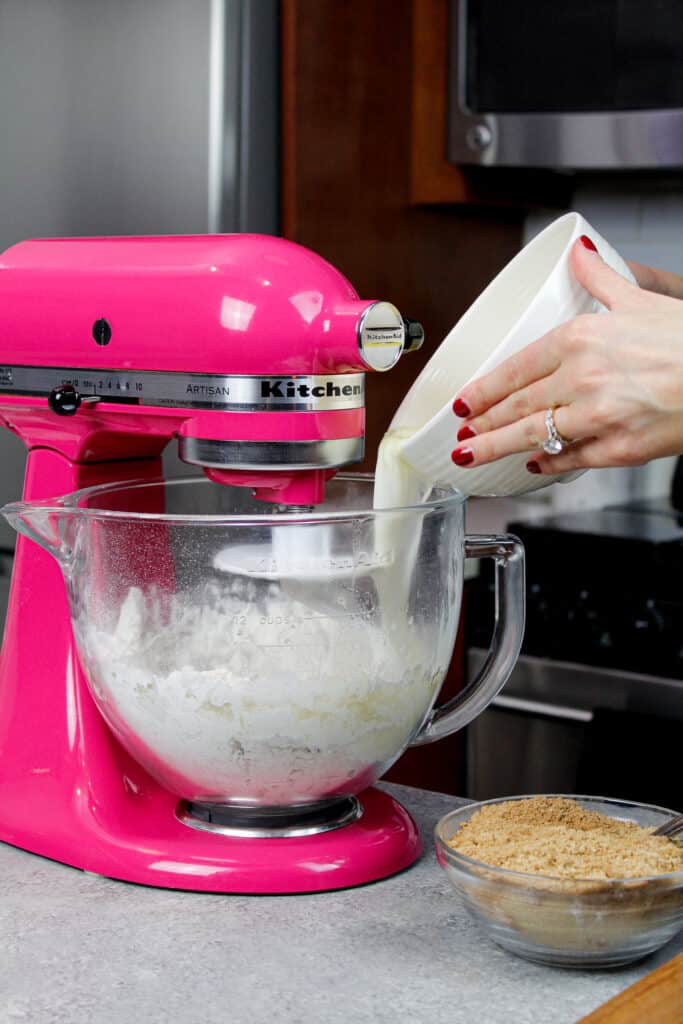
One other general note on this category! In most recipes buttermilk, sour cream, and plain yogurt can all be used in interchangeable in a 1:1 ratio. They all have a bit of acidity to them, and add great moisture and flavor to baked goods.
Buttermilk
- 1 cup buttermilk = 1 Tbsp lemon juice or white vinegar + enough whole milk or alternative milk to make 1 cup
- 1 cup buttermilk = 1 cup alternative yogurt (soy, oat, almond, coconut, etc.)
- 1 cup buttermilk = 1 cup plain yogurt
- 1 cup buttermilk = 3/4 cup plain full-fat greek yogurt + 1/4 cup water
- 1 cup buttermilk = 1 cup sour cream
Whole Milk
- 1 cup whole milk = 1 cup alternative milk (soy, oat, almond, coconut, etc.)
- 1 cup whole milk = 1 cup skim milk + 2 Tbsp melted butter
- 1 cup whole milk = 1 cup sour cream
- 1 cup whole milk = 1 cup plain yogurt
- 1 cup whole milk = 1/2 cup evaporated milk + 1/2 cup water
Heavy Cream
- 1 cup heavy cream = 1 cup whipping cream
- 1 cup heavy cream = 1 cup skim or whole milk + 2 Tbsp melted butter
Sour Cream
- 1 cup sour cream = 1 cup plain yogurt
- 1 cup sour cream = 3/4 cup plain full-fat greek yogurt + 1/4 cup water
- 1 cup sour cream = 1 cup buttermilk
Plain Yogurt
- 1 cup plain yogurt = 1 cup sour cream
- 1 cup plain yogurt = 3/4 cup plain full-fat greek yogurt + 1/4 cup water
- 1 cup plain yogurt = 1 cup buttermilk
Egg Substitutions Swaps
Eggs add both structure and flavor to baked goods! They’re difficult to perfectly substitute, but the swaps below help create eggless baked goods with great texture and taste.
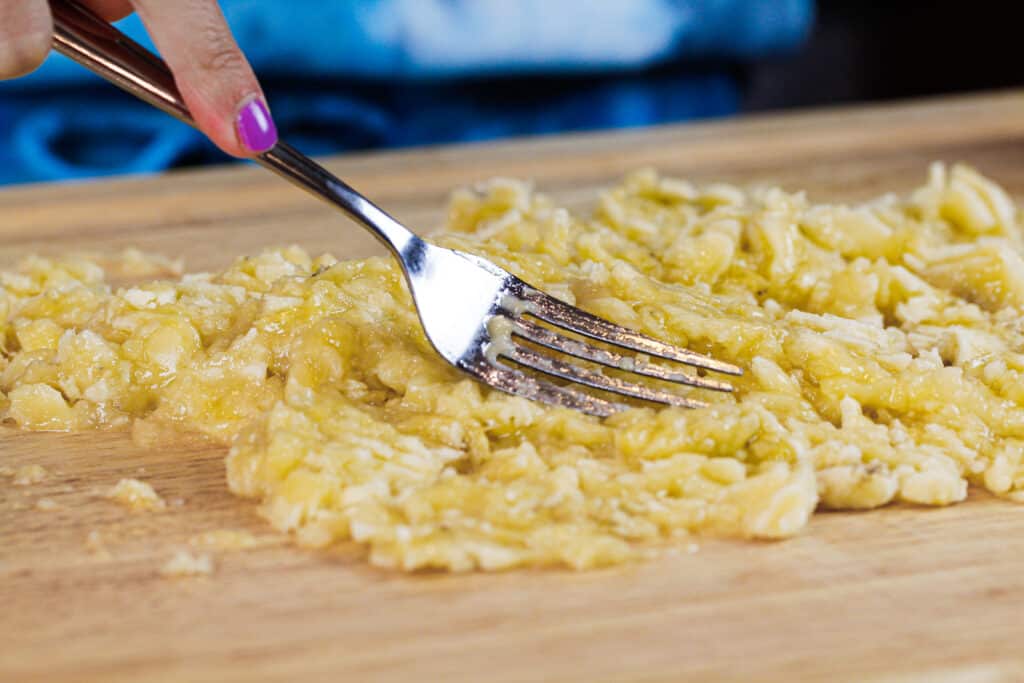
My favorite egg substitution is applesauce with a bit of baking powder (like in my egg free cupcake recipe), but they all work great!
Eggs
- 1 egg = 1/4 cup applesauce + 1/4 tsp baking powder
- 1 egg = 1 Tbsp ground flaxseed + 3 Tbsp water
- 1 egg = 1 Tbsp chia seeds + 1/3 cup water (let it sit for 5 minutes to thicken)
- 1 egg = 1/4 cup dairy free yogurt (soy, oat, almond, etc).
- 1 egg = 1 1/2 Tbsp vegetable oil + 1 1/2 Tbsp water + 1 tsp baking powder
- 1 egg = 1/4 cup banana mashed with 1/4 tsp baking powder
- 1 egg = 1/4 cup pureed silken tofu
- 1 egg = 3 Tbsp mayonnaise
Egg Whites
- 1 egg white = 3 Tbsp aquafaba (chickpea liquid)
Egg Yolks
- 1 egg yolk = 1 Tbsp soy lecithin (soybean oil)
Leavening Agents and Yeast
A key component of any recipe is its leavening agent! Without a little help rising, our baked goods would turn out dense and flat.
The most common leavening agents are baking soda and baking powder, but I’ve also decided to include yeast in this category.
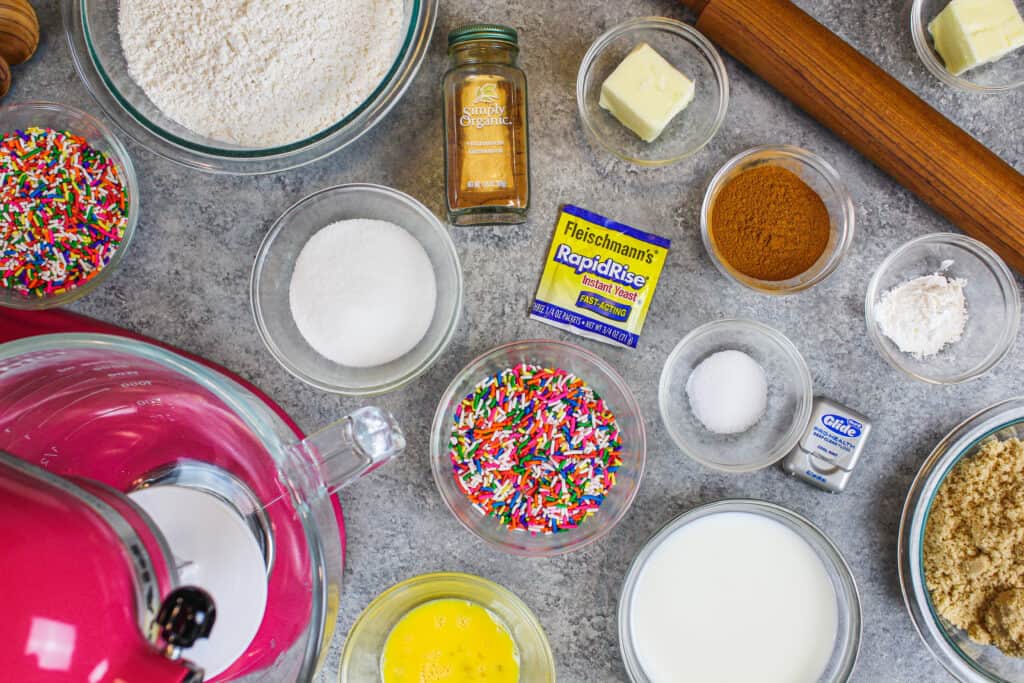
It has been especially hard to find yeast lately, so there are some substitutions below for it too!
Baking Powder
- 1 tsp baking powder = ¼ tsp baking soda + ½ tsp cream of tartar + ¼ tsp cornstarch (you need the cream of tartar to activate baking soda because it’s acidic).
Baking Soda
- 1/2 tsp baking soda = 1 1/2 tsp baking powder
Active Yeast
- 1 packet (1/4 ounce) active dry yeast = 2 1/4 tsp active dry yeast
- 1 packet (1/4 ounce) active dry yeast = 2 1/4 tsp rapid-rise or instantyeast
- 1 packet (1/4 ounce) active dry yeast = 1 cup sourdough starter less 1/2 cup water less 3/4 cup of flour from the recipe (to compensate for the water & flour in the starter)
Instant or Rapid Rise Yeast
- 1 packet (1/4 ounce) instant yeast = 2 1/4 tsp active dry yeast (just be sure to activate the yeast in water before adding it, and give the dough more time to rise).
- 1 packet (1/4 ounce) instant yeast = 2 1/4 tsp rapid-rise yeast
- 1 packet (1/4 ounce) instant yeast = 1 cup sourdough starter less 1/2 cup water less 3/4 cup of flour from the recipe (to compensate for the water & flour in the starter)
Butter and Fats
Now we’re getting to the good stuff. Most of you know by now that I’m team butter, but there are tons of alternative fats you can use in baking too!
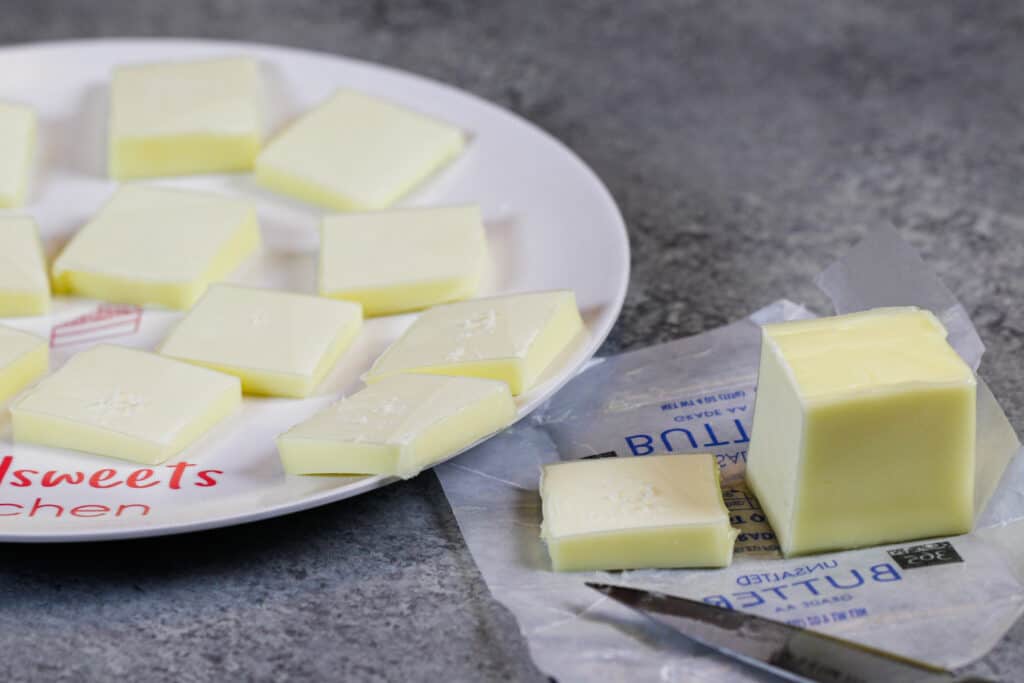
Salted & Unsalted Butter
- 1 cup unsalted butter = 1 cup salted butter
- 1 cup unsalted butter = 1 cup vegetable shortening
- 1 cup unsalted butter = 1 cup vegan buttery sticks less 1/2 tsp salt from recipe
- 1 cup unsalted butter = 1 cup lard less 1/2 tsp salt from recipe
- 1 cup unsalted butter = 1 cup margarine (this can work in some baking recipes but I don’t recommend this swap for any frosting recipes!)
- 1 cup salted butter = 1 cup vegetable shortening + 1/2 tsp salt
- 1 cup salted butter = 7/8 cup lard + 1/2 tsp salt
Vegetable Oil
- 1 cup vegetable oil = 1 cup canola oil
- 1 cup vegetable oil = 1 cup coconut oil
- 1 cup vegetable oil = 1 cup avocado oil
- 1 cup vegetable oil = 1 cup applesauce
- 1 cup vegetable oil = 1 cup melted unsalted butter
- 1 cup vegetable oil = 1 cup mashed bananas
- 1 cup vegetable oil = 1 cup canned pumpkin
Sugars and Sweeteners
I’ve saved the sweetest category for last. Below are some swaps for sugars and sweeteners.
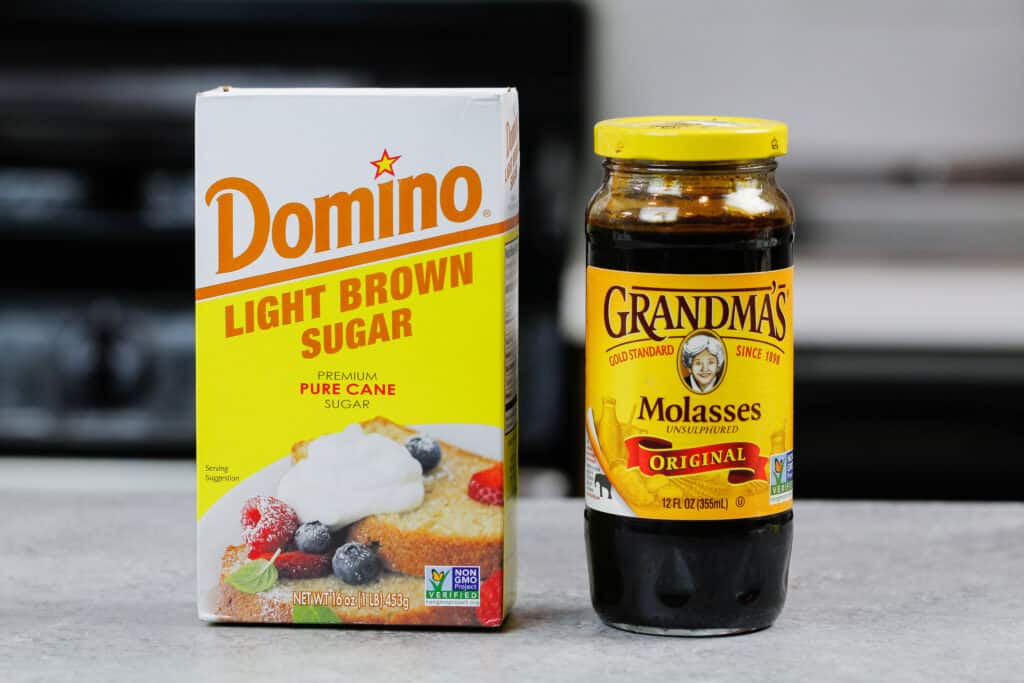
Granulated Sugar
- 1 cup granulated sugar = 1 cup brown sugar (brown sugar has a bit more moisture but works 1:1 in most recipes)
- 1 cup granulated sugar = 1 cup alternative sugar (coconut, maple, date, etc.)
- 1 cup granulated sugar = 3/4 cup honey
- 1 cup granulated sugar = 3/4 cups maple syrup
- 1 cup granulated sugar = 2/3 cup agave
- 1 cup granulated sugar = 1 tsp stevia (this adds the needed sweetness for flavor, but can throw off the texture! Be careful using this swap).
Brown Sugar
- 1 cup light brown sugar = 1 cup granulated sugar + 1 Tbsp molasses
- 1 cup light brown sugar = 1 cup dark brown sugar
Light Corn Syrup
- 1 cup light corn syrup = 1 1/4 cup granulated sugar + 1/3 cup water
Molasses
- 1 cup molasses = 1 cup dark corn syrup
- 1 cup molasses = 1 cup maple syrup
- 1 cup molasses = 1 cup honey
- 1 cup molasses = 1 cup packed dark brown sugar
Powdered Sugar
- 1 cup powdered sugar = 1 cup granulated sugar finely blended (must be blended ultra fine to be used in frosting)
Let Me Know What You Think!
If you found this baking substitutions guide helpful, please let me know!
Or if you have any additional ingredient swap questions or suggestions, please share them in the comments section below 🙂
Other Post You Might Enjoy
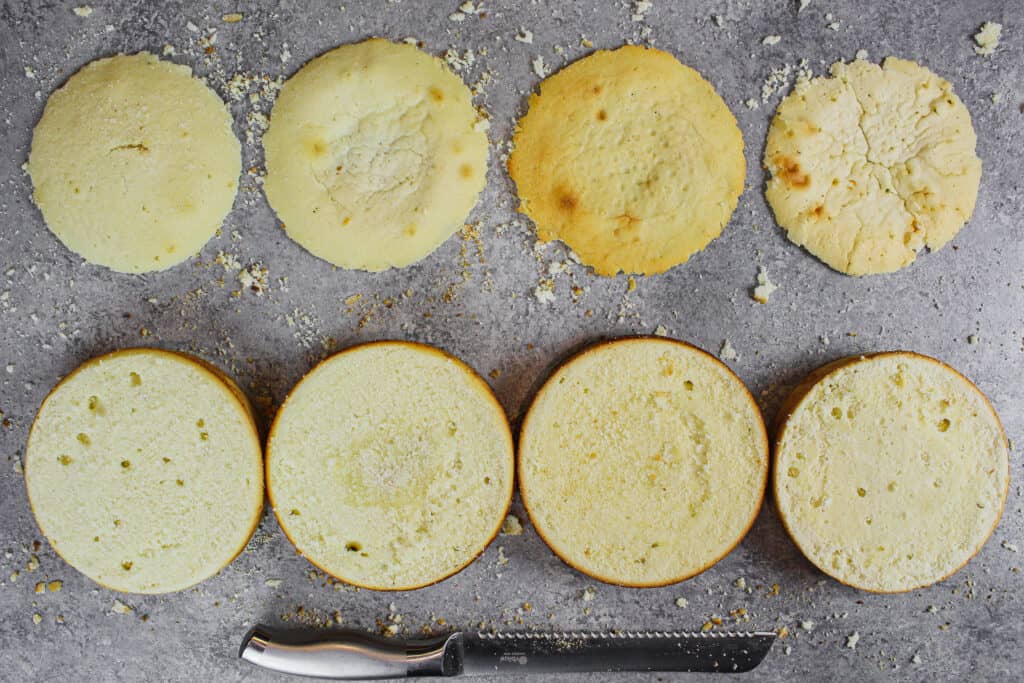

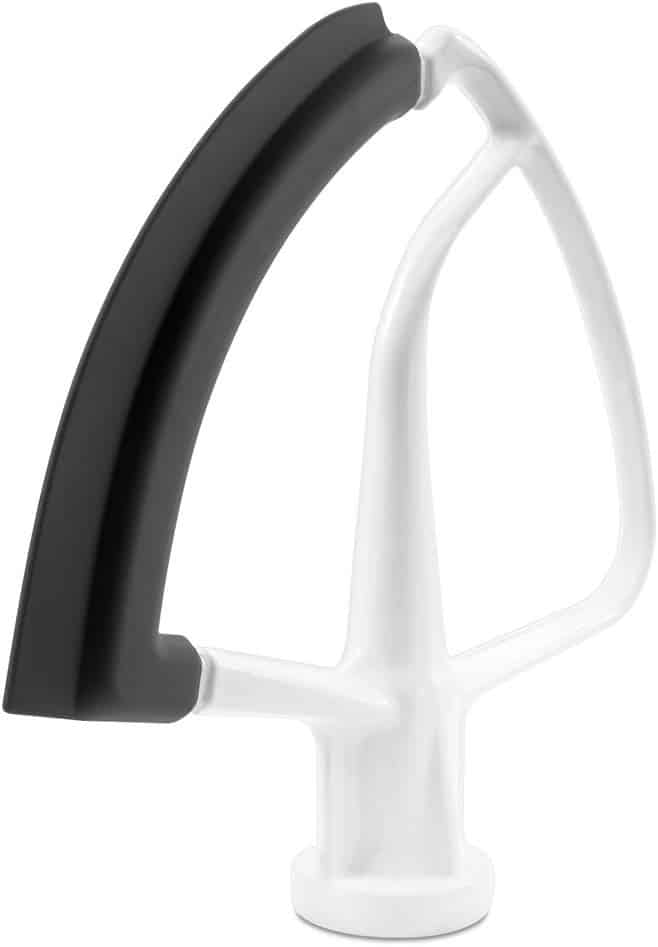
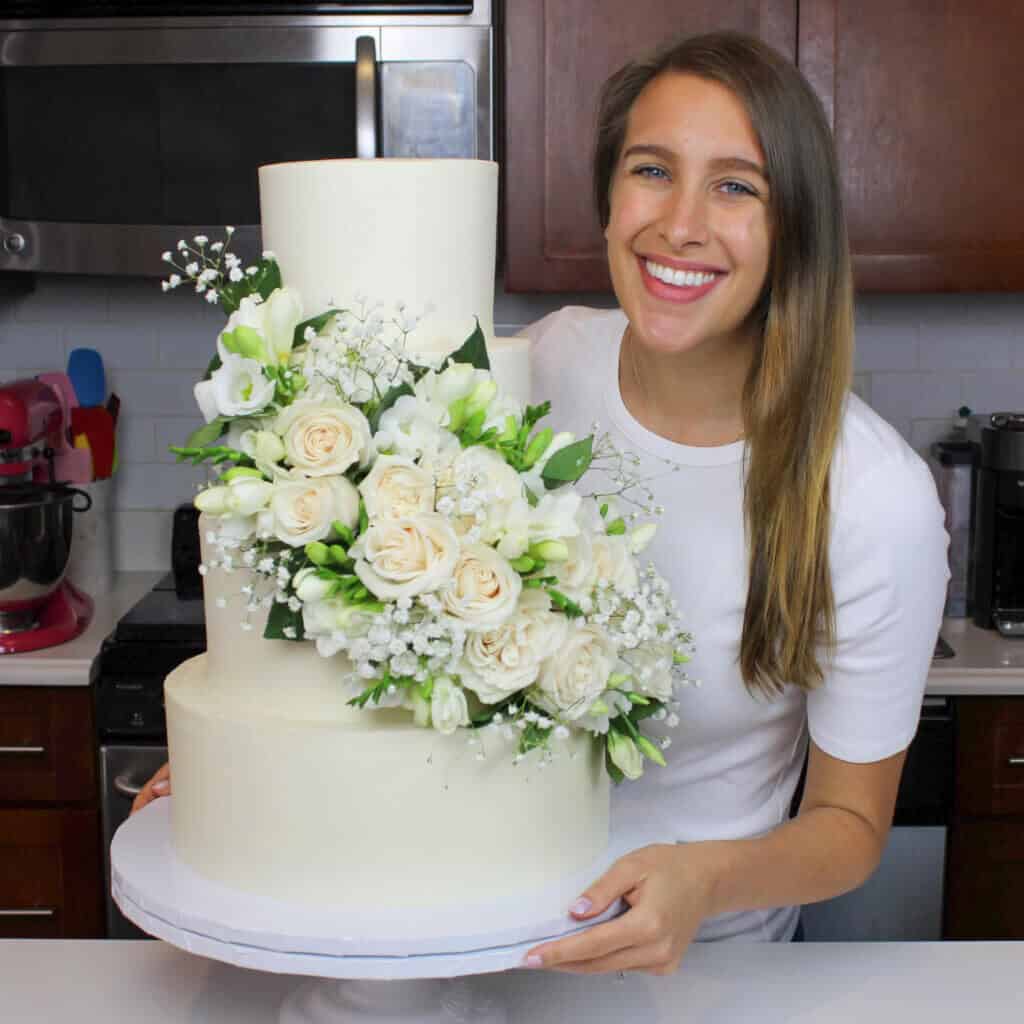

Gere
Thursday 17th of November 2022
Terrific, very helpful
Chelsweets
Saturday 19th of November 2022
Thanks Gere!! Glad you enjoyed this post :)
Cake Troubleshooting Guide: Cake Baking Problems and Solutions
Tuesday 6th of September 2022
[…] That’s a whole different topic, which I’ve covered in a separate ingredient substitutions post! […]
Why Do Cakes Sink In The Middle? Learn What Happened & How to Fix It
Sunday 26th of June 2022
[…] American Buttercream Smooth Frosting Tutorial Black Buttercream Tutorial Substitution Guide […]
myr
Tuesday 5th of April 2022
What is a dairy-free substitute for the 3 Tbsp heavy cream or whipping cream in the Vanilla Buttercream frosting?
Raspberry Cupcakes: Delicious, From-Scratch Recipe
Saturday 26th of March 2022
[…] are some swaps and substitutions that can be made in this […]